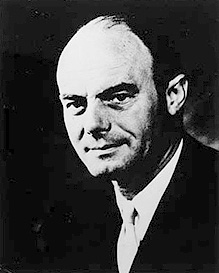 D. MEAD JOHNSON, A&S 1936, was encouraged to apply to Johns Hopkins by his father, who had collaborated with two Hopkins scientists in the development of vitamin D for the prevention of rickets.
D. MEAD JOHNSON, A&S 1936, was encouraged to apply to Johns Hopkins by his father, who had collaborated with two Hopkins scientists in the development of vitamin D for the prevention of rickets.
During World War II, Mead Johnson served as a volunteer with Britain’s armed forces and was decorated by both the British and French governments. He had been excluded from combat service with United States forces because of back problems.
After the war, he joined Mead Johnson, the pharmaceuticals firm founded by his grandfather, where as president and chief executive officer he built the medium-sized business into a worldwide marketer of nutritional products and pharmaceuticals. The company merged in 1969 with Bristol-Myers. Mr. Johnson, a university trustee from 1977 to 1993, endowed this professorship during the Hopkins Hundreds campaign. At the time of his death in 1993, he was an emeritus trustee.